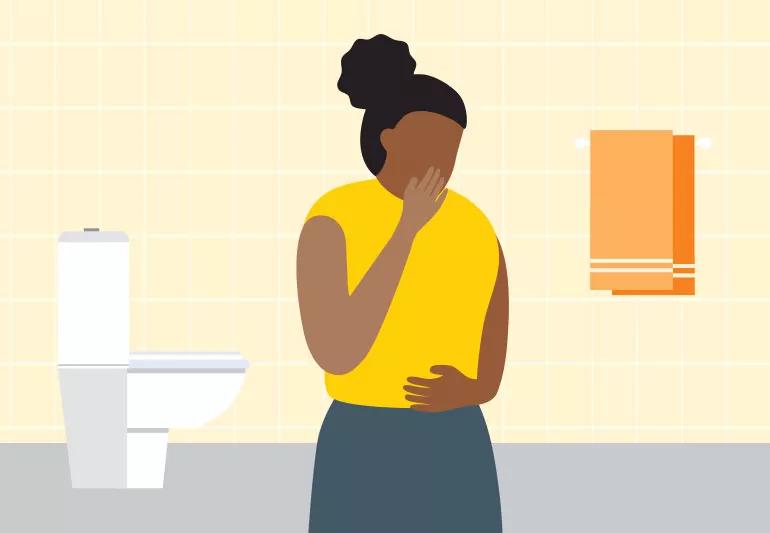Nausea isn’t a common side effect, but it’s not unheard of, especially if you deal with anxiety

Image content: This image is available to view online.
View image online (https://assets.clevelandclinic.org/transform/2ca9b8e9-3090-427e-8511-47aaf3eaf45c/hot-Flash-nausea-1414957551-770x533-1_jpg)
Person suffering from nausea standing in bathroom.
When you’re on the road to menopause, hot flashes may be a common occurrence — even multiple times per day. They’re not pleasant, that’s for sure. But can they actually make you feel sick?
Advertisement
Cleveland Clinic is a non-profit academic medical center. Advertising on our site helps support our mission. We do not endorse non-Cleveland Clinic products or services. Policy
Ob/Gyn and certified menopause practitioner Claudia Mason, MD, says it’s possible to feel nauseated in connection with a hot flash, but it’s very uncommon. Here’s what to know about hot flashes and nausea, including when to connect with your healthcare provider for a deeper dive into what’s going on.
Nausea isn’t really a symptom of hot flashes — but anxiety is, and nausea can be a symptom of anxiety. That means that a hot flash could make you feel anxious, which could, in turn, make you feel nauseated.
It’s not a common symptom of hot flashes, but it’s not unheard of, either.
“Anxiety, in general, increases slightly during the menopausal transition,” Dr. Mason says, “and sometimes, it just feels socially embarrassing to have a hot flash in front of somebody else, which can cause anxiety.”
One study found that women with high anxiety were five times more likely to experience hot flashes than those in the “normal anxiety range.” And nausea is common during bouts of anxiety — so it stands to reason that if your hot flashes trigger your anxiety, your anxiety could then trigger feelings of nausea.
Menopausal hot flashes come on suddenly, usually starting with a feeling of intense heat in your torso or chest that quickly rises to your neck and face. Symptoms often include:
Advertisement
After a hot flash, you might feel a bit of a chill as sweat evaporates from your body.
On the whole, Dr. Mason says it’s important to note that most people don’t feel sick after a hot flash. In most people, they pass just as quickly as they come on.
“They’re quite literally a flash,” she says. “The heat comes from the chest, moves up to your head and then, pretty quickly dissipates.”
You could feel a little, well, gross afterward, especially if you’re suddenly very sweaty at a time when you wouldn’t typically be. It’s OK to excuse yourself so that you can gather your composure and freshen up, if you need to!
But if anxiety is something you already struggle with, the anxious feelings that can accompany a hot flash may make you feel nauseated and slightly unwell afterward. Nausea can be a symptom of an anxiety disorder, and stress nausea, as it’s called, can even cause vomiting (though that’s not a common side effect of hot flashes).
A little post-hot flash nausea once in a while probably isn’t anything to worry about. But if it happens regularly, make an appointment with a healthcare provider to be sure nothing else is at play.
“If your body is sending a lot of blood to your face during a hot flash, theoretically you could feel a little bit of nausea or even dizziness,” Dr. Mason says, “but for the most part, I don’t hear patients complain about those things.”
Hot flashes can also be a symptom of:
If you suspect that your hot flash-induced nausea is related to anxiety — whether in general or specific as it relates to menopause — that’s also a cause for a conversation with your healthcare provider.
“Nausea isn’t typical of a menopausal hot flash,” Dr. Mason reiterates, “so if you’re experiencing it, it’s important to figure out what else is going on.”
Advertisement

Sign up for our Health Essentials emails for expert guidance on nutrition, fitness, sleep, skin care and more.
Learn more about our editorial process.
Advertisement
Estrogen loss contributes to bone loss, which significantly raises your risk of osteopenia and osteoporosis
Making certain changes to your diet, sleep habits and even your wardrobe may help lessen the impact of menopause symptoms
A women’s health specialist explains those cold flashes that come on quickly
Changing hormone levels can bring issues like brittle nails, indigestion, dry skin and new allergies (to name a few!)
The choices you make at mealtime could reduce hot flashes or make them worse
If you’ve noticed changes in your mood and mental health while going through menopause, you’re not alone
Missed periods, heavy periods, painful sex and frequent hot flashes are just a few symptoms worth discussing with your provider
At-home tests measure FSH levels in urine, but they can’t actually diagnose menopause
Prioritize your health by managing stress, strengthening your social connections and getting quality sleep
Bolsters, blankets, pillows and blocks can offer extra support, stability and comfort
Allergies, postnasal drip, asthma or reflux could be to blame for a cough that won’t quit